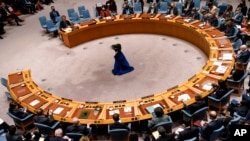The U.N. Security Council voted Sunday to hold an emergency special session of the wider membership in the General Assembly this week on Russia’s invasion of Ukraine, after Moscow blocked a draft resolution in the council deploring its aggression.
“Russia vetoed Friday’s resolution,” U.S. Ambassador Linda Thomas-Greenfield reminded council members. “But as I have said before, Russia cannot veto our voices. Russia cannot veto the Ukrainian people. And Russia cannot veto the U.N. Charter. Russia cannot, and will not, veto accountability.”
Russia also voted against the move to the General Assembly, but as it was a procedural vote, no vetoes were in play. The vote broke down identically to Friday’s failed resolution, with 11 of the 15 Security Council members supporting it and China, India and the UAE abstaining.
“Any attempt to circumvent the position of the Russian Federation, any attempt to disregard it, undermines the very bedrock of the U.N. Charter,” Russian envoy Vassily Nebenzia told the council.
Monday’s meeting will be held under the General Assembly resolution known as “Uniting for Peace.” It allows for special meetings of the entire membership when the U.N. Security Council is deadlocked on an issue and cannot exercise its mandate to maintain or restore international peace and security. In this case, because of Russia’s veto.
Uniting for Peace
Although the council has been divided on many issues, Uniting for Peace has been invoked on less than a dozen occasions since it was adopted in 1950, according to Security Council Report, which tracks U.N. meetings. The last time was 40 years ago concerning Israel.
“These are issues that affect all member states, and now, in the General Assembly, they can all make their voices heard on Russia’s war of choice,” Thomas-Greenfield said. “We will then vote on a resolution that will hold Russia to account for its indefensible actions and for its violations of the U.N. Charter.”
She said that a vote on a draft resolution is not likely before at least Wednesday.
“The U.N. General Assembly emergency session is all about condemning an unprovoked war, it is all about upholding the U.N. Charter, it is about sending a clear and iron-strong message of what is acceptable and what is not,” said Albanian U.N. envoy Ferit Hoxha, whose government co-sponsored the resolution with the United States.
In addition to going to the General Assembly, Ukraine’s ambassador said his country is also seeking an emergency hearing and order against Russia at the International Court of Justice, alleging that Russia made false claims of genocide in the Luhansk and Donetsk regions of eastern Ukraine to justify its invasion and is now planning genocidal acts elsewhere in Ukraine.
“Russia will have to answer for its behavior at the world court at The Hague,” Sergiy Kyslytsya said.
Switching from English to Russian, the Ukrainian ambassador directly addressed his Russian counterpart, telling Nebenzia that there are always choices in life.
“One can remain a human being, a person, or they can continue to defend evil. And this is a choice which lies with every individual, always,” Kyslytsya said.
Around 200 supporters of Ukraine rallied outside the United Nations during the Security Council meeting on Sunday.
Growing humanitarian crisis
Russia’s invasion has exacerbated the humanitarian situation in the country. Before Russia’s offensive, the United Nations and its aid partners were assisting nearly two million people in the Donbas region of eastern Ukraine on both sides of the line of contact between the government-controlled areas and the region held since 2014 by Russian-backed separatists.
Now hundreds of thousands of Ukrainians are on the move inside the country seeking safety, as well as crossing into neighboring countries, including Poland, Romania and Moldova.
On Friday, the United Nations released $20 million from its emergency response fund to meet immediate needs. Later this week in Geneva it is set to launch an appeal for more than $1 billion to cover the next three months.
The council will meet again Monday afternoon to discuss the growing humanitarian crisis, France’s ambassador said. The U.N. humanitarian chief and the high commissioner for refugees are both expected to deliver updates.
“France will, alongside Mexico, submit a draft resolution in order to guarantee unfettered humanitarian access to meet the urgent needs of the people in Ukraine,” Ambassador Nicolas de Riviere said.
He told reporters later that it would likely be put to a vote on Tuesday.





